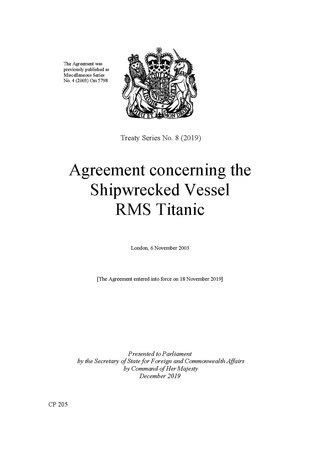
A copyright is a type of intellectual property that gives the creator of an original work, or another owner of the right, the exclusive, legally secured right to copy, distribute, adapt, display, and perform a creative work, usually for a limited time. The creative work may be in a literary, artistic, educational, or musical form. Copyright is intended to protect the original expression of an idea in the form of a creative work, but not the idea itself. A copyright is subject to limitations based on public interest considerations, such as the fair use doctrine in the United States.

Itar-Tass Russian News Agency v. Russian Kurier, Inc., 153 F.3d 82, was a copyright case about the Russian language weekly Russian Kurier in New York City that had copied and published various materials from Russian newspapers and news agency reports of Itar-TASS. The case was ultimately decided by the United States Court of Appeals for the Second Circuit. The decision was widely commented upon and the case is considered a landmark case because the court defined rules applicable in the U.S. on the extent to which the copyright laws of the country of origin or those of the U.S. apply in international disputes over copyright. The court held that to determine whether a claimant actually held the copyright on a work, the laws of the country of origin usually applied, but that to decide whether a copyright infringement had occurred and for possible remedies, the laws of the country where the infringement was claimed applied.
Extraterritorial jurisdiction (ETJ) is the legal ability of a government to exercise authority beyond its normal boundaries.
A work of the United States government is defined by the United States copyright law, as "a work prepared by an officer or employee of the United States Government as part of that person's official duties". Under section 105 of the Copyright Act of 1976, such works are not entitled to domestic copyright protection under U.S. law and are therefore in the public domain.
The Australia – United States Free Trade Agreement (AUSFTA) is a preferential trade agreement between Australia and the United States modelled on the North American Free Trade Agreement (NAFTA). The AUSFTA was signed on 18 May 2004 and came into effect on 1 January 2005.

The International Copyright Act of 1891 is the first U.S. congressional act that extended limited protection to foreign copyright holders from select nations. Formally known as the "International Copyright Act of 1891", but more commonly referred to as the "Chace Act" after Sen. Jonathan Chace of Rhode Island.

The United States Statutes at Large, commonly referred to as the Statutes at Large and abbreviated Stat., are an official record of Acts of Congress and concurrent resolutions passed by the United States Congress. Each act and resolution of Congress is originally published as a slip law, which is classified as either public law or private law (Pvt.L.), and designated and numbered accordingly. At the end of a congressional session, the statutes enacted during that session are compiled into bound books, known as "session law" publications. The session law publication for U.S. Federal statutes is called the United States Statutes at Large. In that publication, the public laws and private laws are numbered and organized in chronological order. U.S. Federal statutes are published in a three-part process, consisting of slip laws, session laws, and codification.

The Uruguay Round Agreements Act is an Act of Congress in the United States that implemented in U.S. law the Marrakesh Agreement of 1994. The Marrakesh Agreement was part of the Uruguay Round of negotiations which transformed the General Agreement on Tariffs and Trade (GATT) into the World Trade Organization (WTO). One of its effects is to give United States copyright protection to foreign works that had previously been in the public domain in the United States.

The Bricker Amendment is the collective name of a number of slightly different proposed amendments to the United States Constitution considered by the United States Senate in the 1950s. None of these amendments ever passed Congress. Each of them would require explicit congressional approval, especially for executive agreements that did not require the Senate's two-thirds approval for treaty. They are named for their sponsor, conservative Republican Senator John W. Bricker of Ohio, who distrusted the exclusive powers of the president to involve the United States beyond the wishes of Congress.
The Indian Appropriations Act is the name of several acts passed by the United States Congress. A considerable number of acts were passed under the same name throughout the 19th and early 20th centuries, but the most notable landmark acts consist of the Appropriation Bill for Indian Affairs of 1851 and the 1851 Indian Appropriations Act.

The United States is not a state party to the Rome Statute of the International Criminal Court, which founded the International Criminal Court (ICC) in 2002.

This article covers the history of the Philippines from the recognition of independence in 1946 to the end of the presidency of Diosdado Macapagal that covered much of the Third Republic of the Philippines, which ended on January 17, 1973, with the ratification of the 1973 Constitution of the Republic of the Philippines.

In United States copyright law, a copyright notice is a notice of statutorily prescribed form that informs users of the underlying claim to copyright ownership in a published work.

In copyright law, related rights are the rights of a creative work not connected with the work's actual author. It is used in opposition to the term "authors' rights". Neighbouring rights is a more literal translation of the original French droits voisins. Both authors' rights and related rights are copyrights in the sense of English or U.S. law.
The rule of the shorter term, also called the comparison of terms, is a provision in international copyright treaties. The provision allows that signatory countries can limit the duration of copyright they grant to foreign works under national treatment to no more than the copyright term granted in the country of origin of the work.
The international copyright relations of Russia were virtually non-existent for much of the Imperial era continuing into the history of the Soviet Union until the Cold War. The Russian Empire had only a few bilateral copyright treaties with other nations were concluded; these treaties moreover were weak and of short duration. The treaties from Imperial times had all expired by the time of the Russian Revolution.
Since 2008 copyright in Afghanistan has been governed by the law on the support the right of authors, composers, artists and researchers.

Layout designs (topographies) of integrated circuits are a field in the protection of intellectual property.
Remedies for copyright infringement in the United States can be either civil or criminal in nature. Criminal remedies for copyright infringement prevent the unauthorized use of copyrighted works by defining certain violations of copyright to be criminal wrongs which are liable to be prosecuted and punished by the state. Unlike civil remedies, which are obtained through private civil actions initiated by the owner of the copyright, criminal remedies are secured by the state which prosecutes the infringing individual or organisation.

The Agreement Concerning the Shipwrecked Vessel RMS Titanic is a treaty open to all states regarding the protection of the shipwreck of the RMS Titanic. Following the passage of the RMS Titanic Maritime Memorial Act in 1986, the United States began negotiations in 1997 with the United Kingdom, France, and Canada toward an agreement to protect the wreck. The agreement was signed by the UK in 2003 and by the US in 2004. It was not until 2019 that the US ratified the agreement, bringing it into effect on 18 November, the day of deposit of the instrument of ratification.








